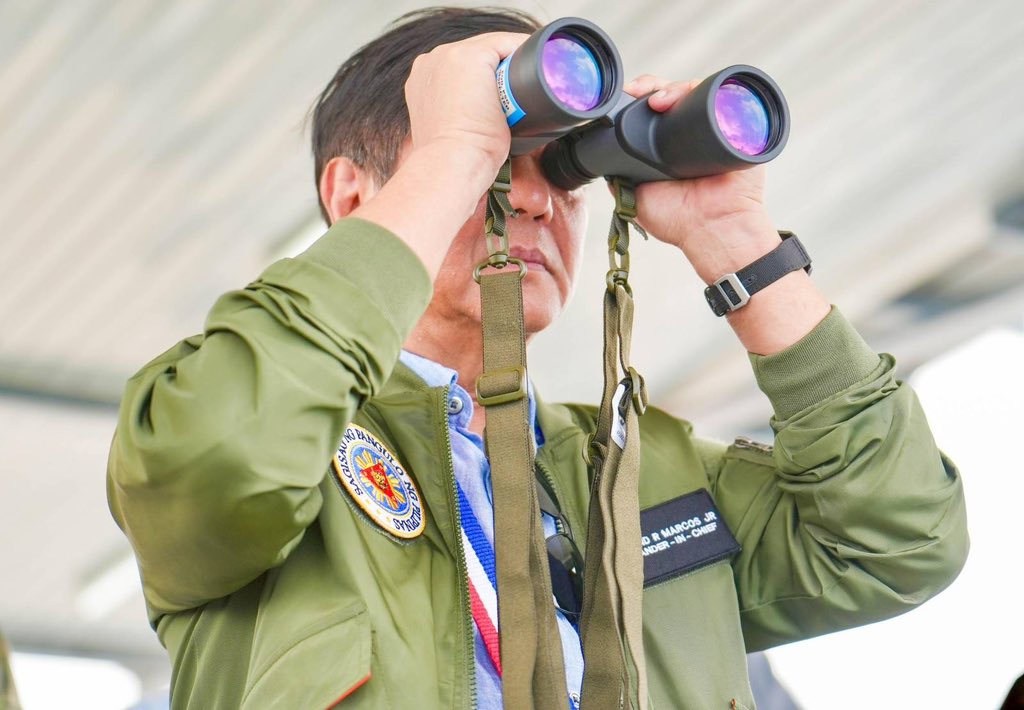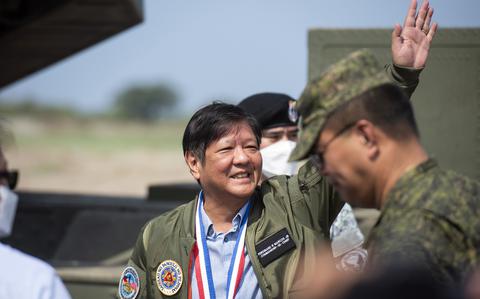beijingwalker
ELITE MEMBER

- Joined
- Nov 4, 2011
- Messages
- 65,195
- Reaction score
- -55
- Country
- Location
With The Philippines’ president Ferdinand Marcos watching, US Army HIMARS fires 6 times but misses target in South China Sea
By SETH ROBSONSTARS AND STRIPES • April 26, 2023
President Ferdinand R. Marcos Jr. uses binoculars to observe the live-fire sea drills of the Philippines and the United States on April 26, 2023. (via Twitter/@bongbongmarcos)
SAN ANTONIO, Philippines — The Philippines’ president was on hand Wednesday as one of the U.S. Army’s best-known weapons missed its target — a decommissioned warship floating miles away in the South China Sea — during a live-fire exercise.
President Ferdinand Marcos Jr. observed from a tower as the High Mobility Artillery Rocket System, or HIMARS, fired six times at the Philippine navy corvette, invisible over the horizon, and a narrator over a public address system described the action down range. U.S. Ambassador to the Philippines MaryKay Carlson sat beside Marcos.
The two HIMARS launchers — designed to strike targets on land — missed each time, but a barrage of ordnance from U.S. and Philippine artillery and aircraft eventually sank the vessel.
“Shore-based fire against a ship is exceptionally hard,” Lt. Col. Nick Mannweiler, a spokesman for Marine Corps Forces Pacific, said during the drill at Naval Station Leovigildo Gantioqui.
The training was part of Balikatan, an annual joint exercise involving more than 17,000 U.S. and Filipino troops that wraps up Friday.
Balikatan, the largest ever in terms of troop numbers, demonstrates further evidence of a decided shift by Marcos toward the Philippines’ longtime ally the United States. His predecessor, Rodrigo Duterte, employed a friendlier approach toward regional rival China, which nonetheless continued to assert control over maritime territory the Philippines claims in the South China Sea.
The HIMARS’ failure to hit a vessel at sea wasn’t a big deal, according to Mannweiler. The training tested troops’ ability to sense a ship and pass targeting information to weapons operated by the U.S. and Philippines, he said.
The training “sets the condition for more fruitful work like this in future,” Mannweiler said.
Once the HIMARS was fired, artillerymen from the 25th Infantry Division and their Philippine counterparts pounded the boat with 105 mm and 155 mm rounds fired from howitzers. Those rounds were on target, said U.S. Army Maj. Jeff Tolbert, a spokesman for the 25th Infantry Division.
Finally, U.S. and Philippine aircraft took turns attacking the target boat with guns and bombs. An Air Force MQ-9 Reaper drone soared overhead, feeding images of the target to commanders calling in the attacks.
A Marine Corps F-35B Lightning II stealth fighter delivered the final blow, and the vessel sank around 2:50 p.m., Tolbert said.
The HIMARS launchers belong to 5th Battalion, 3rd Field Artillery Regiment, based at Joint Base Lewis-McChord, Wash., said battalion commander Lt. Col. Tim Lynch.
Marcos inspected one of the launchers before the live-fire exercise. That launcher, dubbed Wild Bill, is part of Outlaw Platoon, said Alpha Battery commander Capt. Cody Dobiyanski, who showed Marcos around.
The U.S. provided HIMARS batteries, designed to strike targets on land, to Ukraine last year. It’s been credited with evening the odds for the Ukrainians, who are battling Russian invaders.
In combat, U.S. forces would likely use a torpedo or Harpoon missiles against a warship, Mannweiler said.
Philippine army Col. Mike Logico, director of the Joint Command Training Center, told reporters that Marcos understands the challenges of a large-scale bilateral exercise.
“What we demonstrated was the capabilities of the HIMARS and probably also its limitations,” he said.
Last edited:



